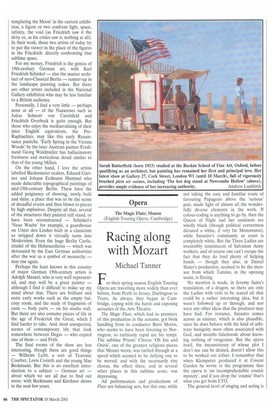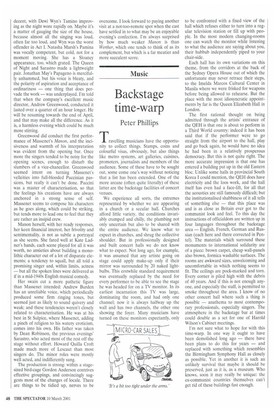Opera
The Magic Flute; Manon (English Touring Opera, Cambridge)
Racing along with Mozart
Michael Tanner
For their spring season English Touring Opera are travelling more widely than ever before, from Perth to Jersey, Darlington to Truro. As always, they began in Cambridge, coping with the harsh and exposing acoustics of the Arts Theatre.
The Magic Flute, which had its premiere of this production in the autumn, got brisk handling from its conductor Brett Morris, who seems to have been listening to Norrington, so ruthlessly rapid are his tempi. The sublime Priests' Chorus 'Oh Isis and Osiris', one of the greatest religious pieces that Mozart wrote, was rattled through at a speed which seemed to be defying one to be moved; and with the necessarily tiny chorus, the effect there, and in several other places in this sublime score, was depressing.
All performances and productions of Flute are balancing acts, but this one, while not taking the easy and familiar route of favouring Papageno above the 'serious' pair, made light of almost all the wonderfully diverse elements in the work. If colour-coding is anything to go by, then the Queen of Night and her assistants are wholly black (though political correctness dictated a white, if very fat Monostatos), while Sarastro's community or court is completely white. But the Three Ladies are irresistibly reminiscent of Salvation Army workers, and of course one can't escape the fact that they do lend plenty of helping hands — though they also, in Daniel Slater's production, seemed to be the menace from which Tamino, in the opening scene, is fleeing.
No mention is made, in Jeremy Sams's translation, of a dragon, so there are only the Ladies with veils to be scared of; that could be a rather interesting idea, but it wasn't followed up or through, and nor were any other ideas that the producer may have had. For instance, Sarastro comes across as sinister, which is also plausible, since he does behave with the kind of arbitrary benignity most often associated with God, and mouths falsehoods about knowing nothing of vengeance. But the opera itself, the inconsistency of whose plot I don't see can be denied, doesn't allow this to be worked out either. I remember that when Klemperer produced it at Covent Garden he wrote in the programme that the opera is 'an incomprehensible cosmic mystery', and if you drop the 'cosmic' that's what you get from ETO.
The general level of singing and acting is decent, with Dewi Wyn's Tamino improving as the night wore rapidly on. Maybe it's a matter of gauging the size of the house, because almost all the singing was loud, often far too loud, and Wyn was the worst offender in Act I. Natasha Marsh's Pamina was vocally competent, but cold, not for a moment moving. She has a Sloaney appearance, too, which grated. The Queen of Night and Sarastro made a lightweight pair. Jonathan May's Papageno is mercifully unhammed, but his voice is bleaty, and the polarity of aspiration and acceptance of ordinariness — one thing that does pervade the work — was underplayed. I'm told that when the company's excellent music director, Andrew Greenwood, conducted it lasted over a quarter of an hour longer. He will be resuming towards the end of April, and that may make all the difference. As it is, a harmless evening which could be much more stirring.
Greenwood did conduct the first performance of Massenet's Manon, and the incisiveness and warmth of his interpretation was evident from the opening bar. Once more the singers tended to be noisy for the opening scenes, enough to disturb the slumbers of a vice-chancellor. Greenwood seemed intent on turning Massenet's velleities into full-blooded Puccinian passions, but really it can't be done. Puccini was a master of characterisation, so that the feelings his creations have are always anchored in a strong sense of self. Massenet seems to compose his characters as he goes along, which could be striking, but tends more to lead one to feel that they are rather an insipid crew.
Manon herself, with her ready responses, her keen financial interest, her frivolity and sentimentality, is not as subtle a portrayal as she seems. She fared well at Kate Ladner's hands, each scene played for all it was worth, no anxieties about building a monolithic character out of a lot of disparate elements; a tendency to squall, but all told a promising singer and, within limits, actress — but all the spoken lines were delivered as if in a mid-1940s English musical comedy.
Her swain cut a more pathetic figure than Massenet intended: Andrew Burden has an unreliable voice, which periodically produced some firm ringing tones, but seemed just as likely to sound quivery and weak; and these tendencies weren't closely related to characterisation. He was at his best in St Sulpice, where Massenet, adding a pinch of religion to his watery eroticism, comes into his own. His father was taken by Dean Robinson, the previous evenings' Sarastro, who acted most of the rest off the stage without effort. Howard QuiIla Croft made much more of Lescaut than most singers do. The minor roles were mostly well acted, and indifferently sung.
The production is strong: within a stagesized bird-cage Gordon Anderson contrives effective groupings, and convincingly suggests most of the changes of locale. There are things to be tidied up, nerves to be
overcome. I look forward to paying another visit at a not-too-remote spot when the cast have settled in to what may be an enjoyable evening's confection. I'm always surprised by how much weaker Manon is than Werther, which one tends to think of as its complement, but which is a far meatier and more succulent score.



































































 Previous page
Previous page